Configuring SFSD Desktop
Introduction
This guide is aimed at helping SFSD Desktop Administrators, or Local Authority IT Support to setup SFSD Desktop within their Local Authority / Council to ensure it works correctly.
The majority of tasks in the configuration process should be carried out during first installation of SFSD Desktop.
If after referring to this guide you still require any additional assistance, you can contact the SFSD Helpdesk using the following details
SFSD Support contacts
Hardware Technical Specifications
This specification is the minimum supported technical requirement that SFSD Desktop can be loaded and operated.
Server Minimum |
|
|---|---|
Operating System |
Windows XP and above. Windows 2000 Server and above. |
Memory |
8gb or above |
Hard Disk |
10gb or above |
Processor |
Pentium 233 or above |
Client Minimum |
|
|---|---|
Operating System: |
Windows XP or above |
Memory: |
4gb or above |
Hard Disk: |
1gb or above |
Processor: |
Pentium 233 or above |
Software
The application is written by MacLaren West Ltd using Delphi, a light weight database is used within the application folder and there is no requirement for a database server.
Connectivity
SFSD Desktop synchronises data using an external website, all data communication are initiated by the user on the local system.
The SFSD Desktop software requires an Internet connection to transfer data to and from the the SFSD Servers. All data is encrypted before it is uploaded to the SFSD Server by SFSD Desktop. The data is passed over HTTP (port 80) as a Encrypted dataset which has been compressed for extra efficiency.
The data encryption used is AES 256.
SFSD Desktop will require access to the following web locations:
Local configuration options
Enabling proxy login details
To allow users to enter their proxy details when starting SFSD Desktop add or set the following setting in the SFSDDesktop.ini file in the setting section:
The full section should look like this:
[Settings]
LocalDataLocation=%APP%/data
ServerAddress=http://aSFSD.food.gov.uk/bin
UseInternetProxy=1
To disable this option you can set the UseInternetProxy=0
Changing local data storage location
Once the SFSD Desktop installation is complete you can configure the data location setting in the SFSDDesktop.ini file, the options you have are:
Location |
Value in Ini File |
|---|---|
application dir |
%APP% |
CSIDL_PROGRAMS |
%PROGRAMS% |
CSIDL_MYDOCUMENTS |
%MYDOCUMENTS% |
CSIDL_DESKTOPDIRECTORY |
%DESKTOPDIRECTORY% |
CSIDL_APPDATA |
%APPDATA% |
CSIDL_LOCAL_APPDATA |
%LOCAL_APPDATA% |
CSIDL_COMMON_APPDATA |
%COMMON_APPDATA% |
CSIDL_COMMON_DOCUMENTS |
%COMMON_DOCUMENTS% |
To get SFSD Desktop to use the users My Documents directory, start the path with the prefix %MYDOCUMENTS%.
Examples:
ini entry |
Resolved path |
|---|---|
LocalDataLocation=Z:dataukfssdata |
Z:dataukfssdata |
LocalDataLocation=%APPDATA% |
C:UsersMac WestAppDataRoamingUKFSS Desktop |
LocalDataLocation=%APPDATA%UKFSS |
C:UsersMac WestAppDataRoamingUKFSS |
LocalDataLocation=dataserverdataukfssdata |
dataserverdataukfssdata |
In the first example, SFSD Desktop will look for user data in the absolute path on the local drive or to a network share mapped to a local drive letter.
The SFSDDesktop.ini file looks like this:
[Configuration]
Interactive=True
LastUpdateID=
ForceDownload=True
[Directories]
0=$APPLICATION\*.*,Recursive
1=$WINDOWS\SomethingForWindows.txt
[AutoUpdateClient]
DownloadBufferSize=4096
ServiceName=AutoUpdateService
[Message]
Class=TROBINMessage
UseCompression=True
[Settings]
LocalDataLocation=%APP%/data
ServerAddress=http://SFSD.food.gov.uk/bin
Setting up The Food Surveillance System (SFSD Desktop)
To configure the system setup, click on the File menu and select
Setup.
General
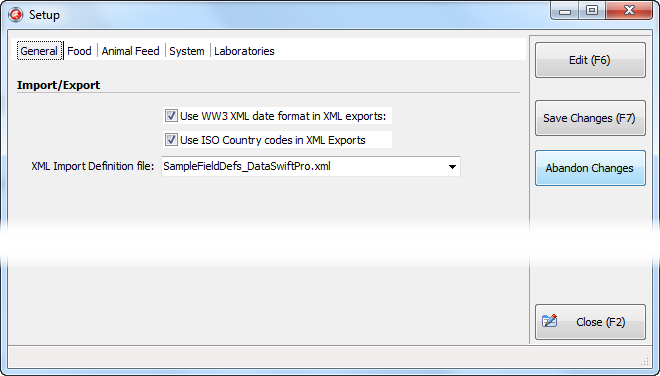
Setup General Tab
Import/Export options: 1. Use WW3 XML date format in XML exports: This forces SFSD Desktop to format fields in export files as Year-Month-Day Hours:Minutes:Seconds (YYYY-MM-DD HH:MM:SS). Please be aware that this has no effect when importing files. 2. Use ISO Country codes in XML Exports: This will use the ISO country codes in the XML export files, the default is the full country name. These are mapped from the full country name field. 3. XML Import Definition file: If you are importing information into SFSD Desktop you should select the appropriate file for you Local information management system.
Food
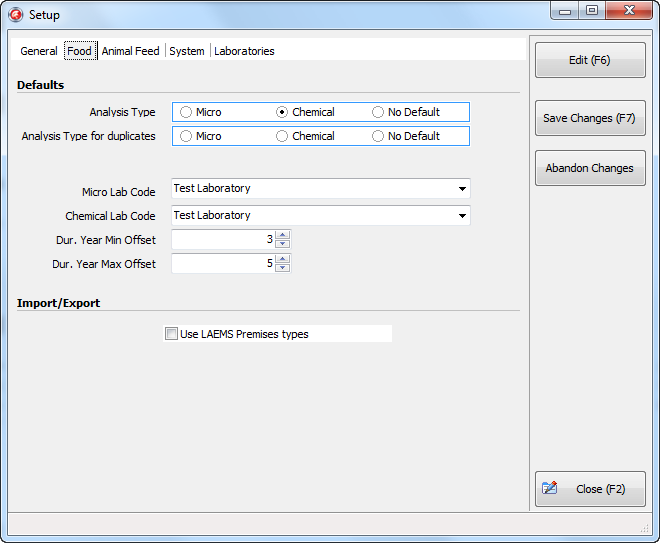
Food tab in setup
In the Food tab you can set up Analysis Type defaults and Lab Code defaults.
Analysis Type – There are three options here that allow you to set the defaults for samples. The options are Micro, Chemical or have No Default, to select an option, select the Radio button to the left of it and chose the “Save Changes” button. Once you have selected an option every time you open the application the Analysis type will default to the selected option.
Analysis Type for Duplicates – This option is used in the same way as Analysis Type but allows you to set up the Analysis Type default of a Duplicated sample.
Analysis Type for Templates - This option is used in the same way as Analysis Type but allows you to set up the Analysis Type default of a Sample Template.
Micro/Chemical Lab Code – These options allows you to select the Laboratory you use most often for both MICRO & CHEMICAL samples. From the drop down menus select your preferred Lab and it pre populates the Laboratory field in SFSD Desktop under the COP tab while entering food samples.
Dur. Year Min/Max Offset – These options will show a warning if the sample durability date is outside the set parameters.
Use LAEMS Premises types – This option should be ticked if the premises information being imported uses LAEMS premises codes. Unmapped codes during import can then be mapped correctly. If this option is unchecked then unmapped codes will be treated as SFSD codes.
Animal Feed
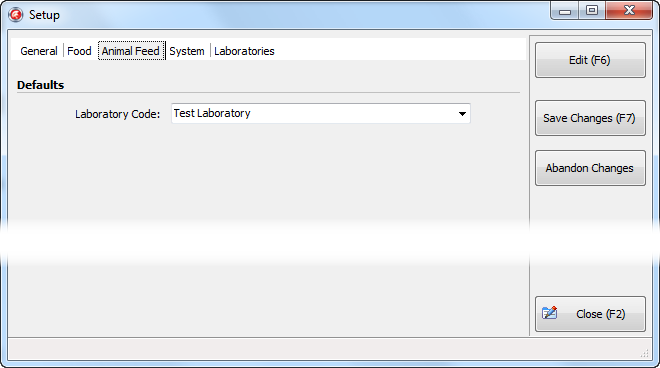
Feed tab in setup
In the Animal Feed tab you can only set a default Laboratory for Feed Samples.
System
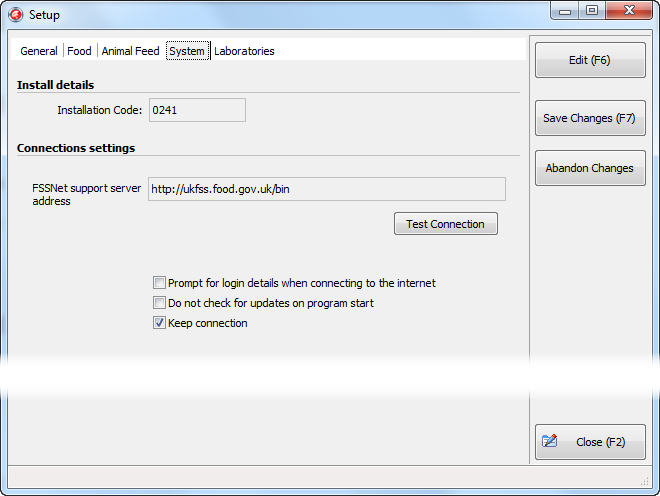
System tab in setup
In the System Tab you can test the connection to the server at the Food Standards Agency and allow for the Software to automatically check for updates. There is also an option to allow the software to prompt for the user’s login details if authentication is required to access the internet.
The Installation Code is automatically populated after the system database has been activated during first login of the user on this system. Each user will get a new activation code and this code can change depending on the system used.
FSSNet Support Server Address: This is the support server address at Food Standards Agency and allows SFSD Desktop to communicate with the FSA SFSD System Server. The address will be populated on Installation of the software. (If it is not displayed please contacting the SFSD Help Desk as this can mean there is a problem with your installation).
You can test the server connection by clicking on the “Test Connection” button. You should receive a message confirming a connection could be made.
Prompt for Login details when connecting to the internet: As SFSD Desktop requires access to the Internet and occasionally at some Local Authorities users are prompted to put in user details to access the Internet.
Do not check for updates on program start: This option has been depreciated in favour of the new data syncing feature but could be used again in the future.
Keep connection: This must always remain checked unless the Food Standards Agency advises you otherwise. This is to maximise connection time, and when checked stops the connection timing out.
Laboratories
Under the Laboratories tab you must select the laboratory or laboratories that you want to appear in the laboratory drop down menus. If your laboratory does not appear in the left column display list, please contact the help desk and request that they are added.
In the example below the selected Laboratories chosen are “Hampshire”, “Kent” and the “Test Laboratory”
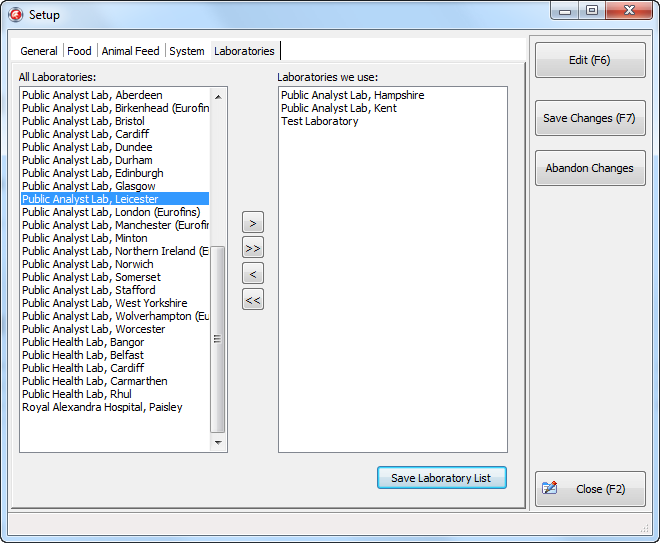
Laboratory tab in setup
Simply move the required laboratory from the left column to the right column using the arrows in the middle, the laboratories on the right will show when you are selecting laboratories from the relevant drop down menus.
Creating a New Officer
Before you add any additional offices, be aware that doing this can affect the data that is transfered in samples from your Local authority through to the SFSD system and the Laboratory. You are therefore encouraged to operate your system using the Headquarters only office location unless agreed with your chosen partner labs. Should you need to set up multiple regional offices, you are encouraged to contact the Food Standards Agency SFSD Helpdesk for additional support before you do this.
Creating a New Sampling Officer
To create a New Food or Animal Feed sampling officer click on the reference menu and select Sample Officers from the drop down menu.
The following appears:
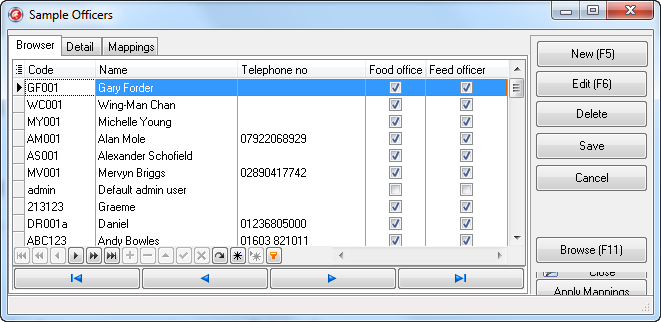
Sample Officer Browser
To create a new officer select the “New” button and enter the details:
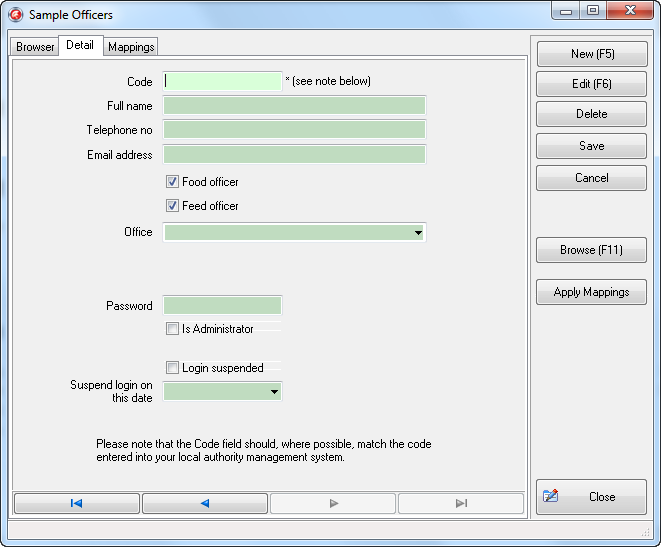 Here you enter the code (wherever possible,
this should match your local authority management system but must be
unique within your SFSD Desktop), usually the officers initials with 2
or three numeric digits, full name, telephone number and email address.
SFSD Desktop uses the email address for login so this is a required
field. It is strongly recommended that you fill in all the details above
as this information will stay with the sample and is available to the
lab.
Here you enter the code (wherever possible,
this should match your local authority management system but must be
unique within your SFSD Desktop), usually the officers initials with 2
or three numeric digits, full name, telephone number and email address.
SFSD Desktop uses the email address for login so this is a required
field. It is strongly recommended that you fill in all the details above
as this information will stay with the sample and is available to the
lab.
You can then decide if the Sample officer is a Food Officer, Feed Officer or Both by selecting one or more check boxes. You can also leave both options blank if the user does not take part in sampling activity.
Enter a password for the user and select if is administrator option if required. If multiple offices are going to be used we would recommend as least one sample officer in each office should be an administrator.
Once you have entered the details click on the “Save” button, you can then repeat this process for all required officers. Close Sample Officer form when finished.
Optional Lookup Lists
Throughout the system there are various drop-down lists which can be populated via the optional Lookup list function.
Specifically the fields that use this feature are:
Brand Name • Food Description • Manufacturer • Distributer • Importer
Survey Reference • Analysis
The optional lookup list feature is in the reference drop down menu. Once selected you will be presented with the following screen:
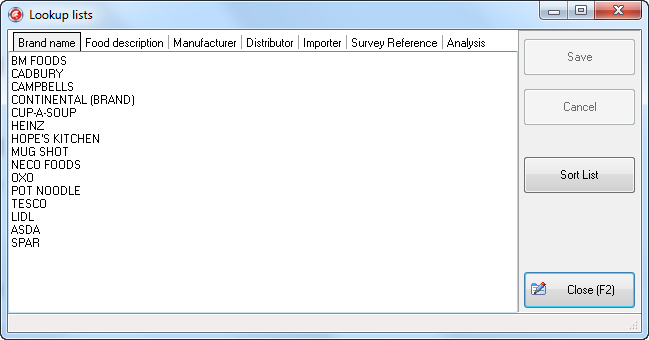
Optional Lookup List Form
The white area is for free text input and can also accept copy and paste data (i.e. from MS word, Local authority management systems)
Simply work though each tab along the top and populate accordingly.
As the title suggests the optional lookup lists are not required but we very much encouraged everyone to utilise the function as it can help to eliminate grammatical variation and spelling mistakes
Importing Food and Animal Feed Premises
SFSD Desktop has the functionality to import the premises information extracted from your local authority management system in CSV format (Premises schema available on the FSA SFSD website) or XML format. Please goto the [mappings][section-mappings] section for more details on required fields.
To import your premises data click on “File” and “Import food / Animal feed premises”. The following form appears:
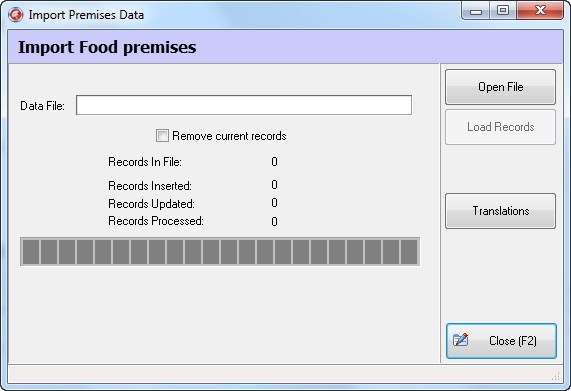
Premises Import Form
Next, browse to the desired .CSV or .XML file and click on the “Load” button.
Once the Import is complete the progress bar will move all the way to the right and display 100%
The remove current records check box is used if you wish to remove any current records you may already have imported in SFSD Desktop. If for instance you have added 2 or 3 new premises details to your file then you can leave the “Remove current records” box unchecked and it will only import those 2 or 3 new premises adding them to your existing details. If you wish to import all premises details fresh select this option, the premsies are not actually removed immediatly but are marked for removal during the sync process.
XML code mapping and import (Food/Feed Premises data)
SFSD Desktop has the functionality to allow the FSS administrator to map your local food safetly risk category, food standards risk category and premises type codes in order to automatically populate the codes during the import routine which are used when entering the samples.
This is accessible via the “Translations” button found within either the “Import food premises” or “Import Feed premises” screens.
With the translations screen open click on “Add” to create a new translation/mapping:
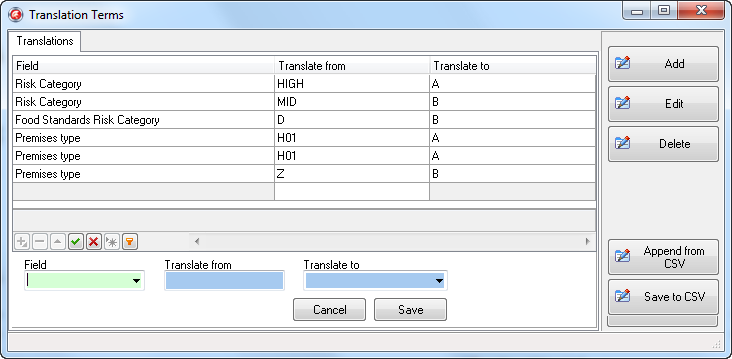
Add translation form
Select the field you wish to map from the drop down selector on the bottom left and input your “Local Code” (translate from) and match it with our corresponding “FSS Code” (translate to):
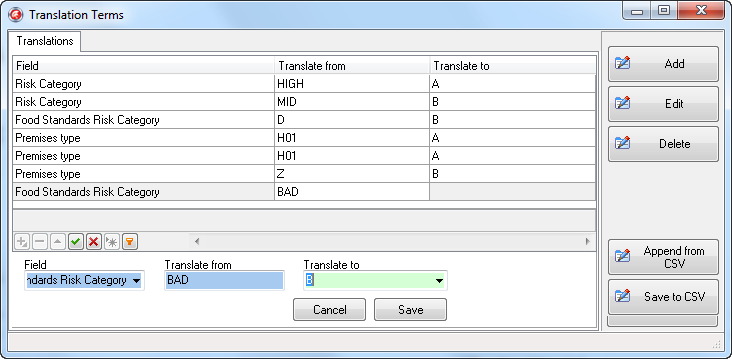
Adding new Translation
The above is an example of mapping the Food Standards Risk Category of “BAD” to the SFSD Code value of “B”
Once you have completed the mapping simply “Save Translations”, close the translations screen and import your premises file by browsing to your file and selecting “Load records”
Importing Food Premsies
CSV Food premises import requirements
Please consult your local authority management system administrator before attempting to extract data.
CSV files need the fields to be in a set order. The field order of Food premises is as follows:
FIeld |
Max Length |
|---|---|
BusinessID |
30 |
PremiseName |
100 |
Address1 |
100 |
Address2 |
100 |
Address3 |
100 |
Address4 |
100 |
PostCode |
30 |
Food Safety Risk Category Code |
10 |
PremiseType Code |
10 |
Food Standards Risk Category Code |
10 |
Food Safety Risk Category Code:
Valid values for the Food Safety Risk Category Code field are:
Value |
|---|
A |
B |
C |
D |
E |
Import Error |
U Unrated |
Premises Type Codes / Mapping
Valid values for Premises Type Codes and descriptions
FSS Code |
FSS Premises Type |
|---|---|
A |
(Primary Producers) |
B |
(Slaughterhouses) |
C |
(Manufacturers/processors) |
D |
(Packers) |
E |
(Importers/Exporters) |
F |
(Distributors/Transporters) |
G |
(Retailers) |
H |
(Restaurants and other Caterers) |
I |
(Materials and Articles Manufacturers and suppliers) |
J |
(Manufacturers mainly selling by retail) |
FSS Code |
LAEMS Premises Type |
|---|---|
A |
(Primary producers) |
C |
(Manufacturers & packers) |
E |
(Importers/Exporters) |
F |
(Distributors/Transporters) |
G |
(Supermarket/Hypermarket) |
G |
(Smaller retailers) |
G |
(Retailers – Others) |
H |
(Restaurant/Café/Canteen) |
H |
(Pub/Club) |
H |
(Take-away) |
H |
(Caring Establishments) |
H |
(School/College) |
H |
(Mobile food unit) |
H |
(Restaurants and caterers - Other) |
Food Standards Risk Category Code:
Value |
|---|
A |
B |
C |
Unrated |
A single line example for a csv file would look like this:
A001,Greggs,144 Sauchiehall Street,Glasgow,,,G3 6LN,A,J,A
Please note the headers are not required and should be excluded from the file.
Importing Animal Feed Premsies
CSV Feed premises import requirements
FIeld |
Max Length |
|---|---|
BusinessID |
30 |
PremiseName |
100 |
Address1 |
100 |
Address2 |
100 |
Address3 |
100 |
Address4 |
100 |
PostCode |
30 |
Feed Risk Category |
10 |
PremiseType Code |
10 |
Registration number |
10 |
Feed Risk Category:
Value |
Description |
|---|---|
H |
(High) |
M |
(Medium) |
L |
(Low) |
Premises Type Codes:
FSS Code |
FSS Premise type |
FSS Code |
LAEMS Premise type |
|
|---|---|---|---|---|
K |
Producers of feed materials |
K |
Primary producers |
|
L |
Stores of feed materials |
L |
Stores |
|
M |
Manufacturers of compound feed stuffs |
M |
Manufacturers, Processors |
|
N |
Importers and representatives of establishments in third countries |
N |
Importers |
|
O |
Intermediaries, distributors and retailers |
O |
Distributor s/Transporters |
|
O |
Retailers |
|||
P |
Manufacturers of additives and premixtures |
P |
Manufacturers, Processors |
|
Q |
Animal farms |
Q |
Livestock Farms |
|
R |
Other feed businesses |
R |
Food Businesses Supplying Co-Products |
Animal Feed Premises CSV Import Example.
11402,One Stop,,110 South Road,Taunton,Somerset,TA1 3BP,H,K,123245
1691,One Stop,,126 Wordsworth Drive,Taunton,Somerset,TA1 2HJ,M,L,M
28940,Thorntons,,21 Old Market Centre,Taunton,Somerset,TA1 2AT,L,M,12536
19549,Ireson's,,2a St. James Street,Taunton,Somerset,TA1 1JH,H,L,34776